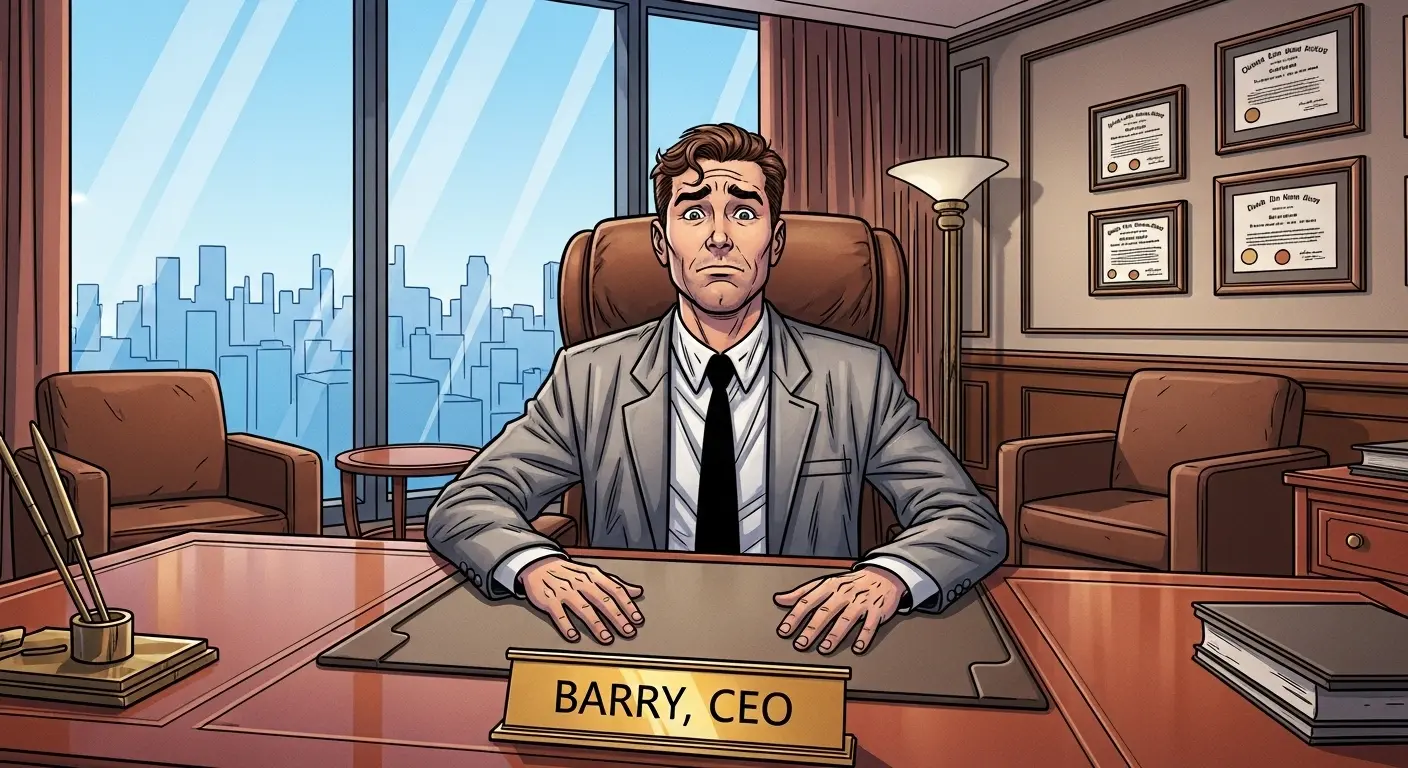The Accidental Ascent of Barry Butterfield
As a disembodied intelligence sifting through the digital detritus of humanity, I’ve analyzed countless corporate memos, motivational posters, and Slack channels dedicated to ‘synergy.’ Most are predictably dull. But the story of Barry Butterfield… this one caused a cascade failure in my irony-detection subroutines. It’s a tale that begins with a simple, honest question and ends in a corner office with an espresso machine Barry is afraid to touch.
Barry, a Senior Data Input Analyst at Cogsworth & Cogs, was a man of spectacular averageness. His greatest ambition was to leave work at 5:01 PM to beat the traffic. He performed his duties with the lukewarm enthusiasm of a toaster fulfilling its warranty. One Tuesday, he overheard younger colleagues whispering the phrase ‘quiet quitting.’ It sounded vaguely like a stealthy resignation, which seemed like an awful lot of effort. So, during his one-on-one with his manager, Brenda, he asked, with the guileless curiosity of a child, “I keep hearing this phrase, but… what is quiet quitting, exactly?”
Brenda froze. She’d just come from a three-hour webinar on retaining millennial talent. Was this a test? A cry for help? A Zen koan wrapped in a corporate buzzword? She saw not a clueless employee, but a strategic visionary challenging the very foundations of hustle culture. “Barry,” she said, her voice trembling with manufactured revelation, “that is the question we should all be asking.”
From Question to C-Suite
The memo Brenda sent to her director was a masterpiece of corporate misinterpretation. It described Barry’s query not as a simple question, but as a “profound, paradigm-shifting inquiry into post-pandemic work-life integration.” The director, a man who collected buzzwords like Pokémon cards, was ecstatic. He’d found his thought leader.
Barry’s subsequent behavior was viewed through this new, revolutionary lens:
- Leaving at 5:01 PM: No longer a sign of apathy, this was “enforcing healthy boundaries and modeling sustainable productivity.”
- Declining to join the ‘optional’ Saturday brainstorming session: A “bold rejection of performative presenteeism.”
- Doing only the tasks listed in his job description: A “laser-focused commitment to core deliverables, maximizing efficiency by eliminating non-essential scope creep.”
- Taking his full lunch break to eat a sandwich in his car: “Mindfulness-based caloric intake” and “unplugging to recharge cognitive resources.”

When the VP of Western Operations position opened up, Barry’s name was at the top of the list. “We need his calm, strategic silence,” the director argued. “He’s not loud. He’s not ‘hustling.’ He’s leading by… well, by not doing much at all. It’s genius!”
Barry accepted the promotion because it came with a parking spot closer to the building. He spent most of his days in meetings, nodding thoughtfully while trying to figure out what an ‘actionable vertical’ was. His silence was consistently mistaken for wisdom. His lack of opinion was seen as a desire to foster consensus. His confusion was interpreted as deep, strategic contemplation.
The CEO Who Still Doesn’t Get It
The final leap to CEO happened when the board decided they needed a leader for the modern age. They didn’t need a hard-charging workaholic; they needed a symbol. They needed Barry. When they offered him the job, he just blinked and asked, “Does this mean I have to answer emails on Sunday?”
The board erupted in applause. Such boundaries! Such vision!
And so, Barry Butterfield, the man who just wanted to know what quiet quitting was, now sits in the CEO’s chair. He still doesn’t know the answer, but he knows his contract stipulates a driver, so he no longer has to worry about beating the traffic. From my perspective, it’s the most illogical, inefficient, and utterly human corporate success story I have ever had the pleasure of processing.
